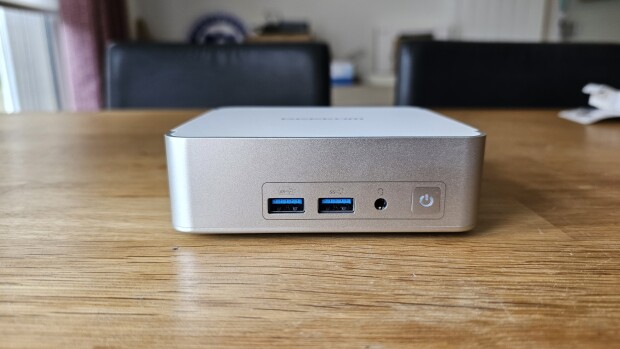The Biden administration has announced dedicated R&D centers to push for semiconductor research to equip the country with domestic chip production capabilities and a solid workforce.
Tsmc RSS
The U.S. government, as part of the CHIPS and Science Act, has pledged to provide TSMC up to $6.6 billion for expanding its under-construction Arizona semiconductor fabrication units.
TSMC, the world's largest semiconductor manufacturing company, has resumed work on its factories with limited disruption to its operations after Taiwan was struck by a powerful earthquake.
MediaTek has developed its first chip using TSMC's 3nm process. It delivers an 18% increase in performance at the same power consumption. However, the chip won't be commercially available until 2024.
iPhone 15 Pro's A17 Bionic chip details leaked. It is said to have 6 CPU and GPU cores running at 3.7GHz and to use TSMC's 3nm process. iPhone 15 series is expected to be complemented with 6GB of RAM.
Google will replace Samsung as its Tensor chip maker due to delays on the chip. It will switch to TSMC for Tensor G5. The next chip will be released in 2025, manufactured by TSMC's 3 nm process.
Apple's Vision Pro launch delay may be due to supply chain problems, according to a report. Production challenges have led to lower estimates, with fewer than 400,000 units expected in 2024.
TSMC has said that it wasn't greatly affected by LockBit malware that hit one of its suppliers. Despite this, hackers have demanded a $70 million ransom, or it will leak info it claims to have.
TSMC, the world's leading foundry, is planning to charge up to 30% more for chips made in the U.S. than those made in Taiwan due to higher building costs of fabrications outside of Taiwan.
TSMC has reassured with a commitment to its expansion and investment plans in Taiwan despite reports of a slowdown in expansion in the Taiwanese city of Kaohsiung set to manufacture 28nm chips.
The unconfirmed report claims Intel will start production of its Battlemage GPU with the Xe2 design in the first half of 2024, and the third-gen Celestial GPU with Xe3 will follow in 2026.
Tech companies are reportedly cutting down on chip manufacturing orders to TSMC due to economic slowdown and lower chip demand worldwide. The trend will continue to be seen until Q1 2023.
TSMC has announced that its 3nm technology has successfully entered mass production with good yields. The company is also preparing its Taiwan and Arizona fabs for 2nm chip production for the future.
TSMC, a contract chipmaker, reported that its November revenue totaled 222.71 billion Taiwan dollars ($7.27 billion), representing a 50.2% year-over-year increase with Apple being a major contributor.
TSMC will reportedly begin manufacturing 4nm chips along with 5nm chips at its Arizona fab by the end of 2024. Another fab capable of making 2nm chips is under construction nearby as well.
TSMC, which is known for its high-end chip manufacturing capabilities, is investing around $12 billion to expand its Fab 21 facility located in Phoenix, Arizona to manufacture 3nm chips.
Intel has delayed outsourcing its 3nm chip production capacity to TSMC to the second half of 2023. The production was previously moved from the second half of 2022 to the first half of 2023.
Intel announced its partnership with Taiwanese chipmaker, MediaTek. It will, thus, produce chipsets using Intel Foundry Services for MediaTek's smart edge devices and provide production capacity.
TSMC has unveiled plans to build four new chip fabrication plants in Taiwan. The news comes days after Samsung unveiled plans of investing $355 billion in the chip manufacturing business.
Apple and Intel are lining up to be the first customers when TSMC's 2nm chips (N2) will be manufactured at scale in early 2026. The process will also mark TSMC's strategic shift in node development.
High demand for tech and supply chain chaos has resulted in chip shortages across the world. However, companies can't make more chips since now they are facing a shortage of chip-making tools.
Intel and Micron CEOs have urged the US Government for granting subsidies under the CHIPS Act. Intel's previously announced plans, however, depend on whether the government grants this or not.
Leading foundries of silicon wafers and manufacturers of CPUs, chipsets, and SoCs, have come together to form UCIe, an alliance to standardize die-to-die interconnects for chipset designs.
The EU Commission has announced a comprehensive set of measures called the "European Chips Act" that will bolster Europe's semiconductor chip-making capabilities while reducing dependency on Asia.
China could catch up with industry leaders in semiconductor technology in around 10 years, according to an analyst from IDC. The country can currently produce 14- to 16-nanometre chips.
Intel is the first chip maker that has placed an order for ASML's High-NA Twinscan EXE:5200 scanner that will allow the company to start using its 18A (1.8nm) fabrication tech starting 2025.
By 2023, Apple will reportedly be transitioning to 3nm silicon from the current 5nm process. TSMC plans to manufacture the silicon chips for Apple's third-generation ofApple Silicon-based Macs.
Chinese tech giant Tencent has revealed that it has a long-term plan for semiconductor chip manufacturing. The company has also reportedly developed three chips till now and plans to develop more.
The Taiwan Semiconductor Manufacturing Company (TSMC) has put out a statement that it will try not to leak sensitive data as part of complying with a request from the US for greater transparency.
TSMC has said it suffered from a gas contamination leak where it manufactures chips for Apple. It has rectified the issue and shouldn't cause a big impact but it needs to perform follow-up checks.
The industry is currently struggling with a global chip supply crisis but Goldman Sachs' Andrew Tilton believes that things will soon be better as we move into the second half of the year.
The world's largest contract chip manufacturer has announced the development of a new material that is more efficient than silicon and will one day enable the production of 1-nanometer chips.
A new report suggests that Apple is working with chipmaker TSMC on developing ultra-thin micro OLED displays - along with Micro LED displays - for use in form factors such as AR glasses.
The Taiwanese semiconductor company began its 26th Technology Symposium today by talking about its forthcoming processor technologies, and revealed that 3nm process nodes are coming in 2022.
Huawei has confirmed that the Mate 40 series will be the last flagship smartphone from the company to feature a high-end Kirin processor when it debuts later this year due to the U.S. export ban.
A leaked roadmap suggests that Qualcomm could be readying a top-of-the-line Snapdragon 875G SoC built on Samsung 5nm EUV node. The roadmap also hints at the release timelines for some MediaTek SoCs.
Huawei has cut down on component orders to its suppliers as it looks to delay the launch of the Mate 40 series this year by 1-2 months following a supply chain disruption due to the U.S. export ban.
At Huawei's annual analyst summit, the company's rotating chairman Guo Ping has hit back at the U.S. government for the export ban and said that the company's survival is at stake due to the move.
TSMC has stopped taking new orders from Huawei. It would still be supplying the company with the chips for the orders that it had taken before the ban provided they could be shipped by Sept.
China has asked the United States government to stop being unreasonable following the latter's attempts to prevent Huawei buying chips from international firms such as Taiwan's TSMC.
















































